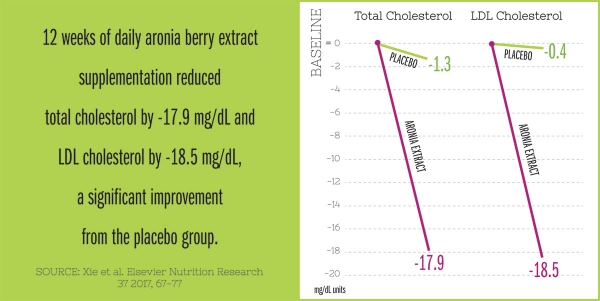Promotional Features
The Heart of the Matter: Why Aronia Berry is a Must for Cardiovascular Health
With global health crises such as the COVID-19 pandemic, the subject of immune health is top of mind and poised to remain so. In February, though, we are reminded about the importance of cardiovascular health thanks to American Heart Month. Of late, black elderberry has received a lot of press for its immune support capabilities. However, another botanical, aronia berry, has equally documented potential to support heart health.
Cardio Health is King
FACT: Heart disease remains the leading cause of death among men and women. And related risk factors such as high blood pressure have been linked to more severe COVID-19 complications. The bottom line is that the cardiovascular system should top the list of health priorities. The pandemic has likely brought about even more cardiovascular challenges because chronic stress and anxiety can exacerbate risk factors related to heart health. And since stress can also negatively impact the immune system, seeking out products to support a strong, healthy and balanced immune system and cardiovascular system is especially relevant in these current times.
Aronia Berry—A Natural Health Solution
Industry data shows that consumers are continuing to seek out natural ingredients and supplements for an easy daily regimen to bolster their overall heart health. Similar to how black elderberry rose to prominence for its immune support benefits, there are other dark berries that have stand-out qualities in the heart health category. The reason? Potent flavonoid actives. So, move over CoQ-10 and omega-3—it’s time to make room for dark berries on the ‘Top 5 Heart Health Ingredients List.’ Aronia berry in particular is the top contender, for good reason.
Given the quantity and quality of scientific research that has already been conducted, it’s surprising that aronia berry’s heart health benefits aren’t being shouted from the rooftops in the same way that European black elderberries have been so fervently embraced for immune health. But perhaps just as 2020 was arguably the “year of the elderberry,” 2021 will be the “year for the aronia berry,” and this unbilled star will take center stage.
Aronia berry (Aronia melanocarpa), also known as chokeberry, originated in North America with a history of use that dates back centuries with Native American cultures. Perhaps in part due to its characteristic astringent flavor profile, it was overshadowed by sweeter table-friendly berries. Even so, Eastern European countries like Poland, now home to roughly 80% of aronia berry cultivation, recognized the aronia berry for its tremendous health value and made it a focus of ongoing clinical research and a popular food and dietary supplement for cardiovascular health. Scientific findings helped to highlight the tremendous antioxidant capacity of aronia berry due to its incredibly rich flavonoid content and added data to its anecdotal heart health benefits. As a result, aronia berry is gaining steam in the United States, in both cultivation and formulations. Further human clinical studies have underscored the remarkable impacts this little dark berry can have on key markers of cardiovascular health.
Scientific Support for Aronia Berry Benefits
The health properties of aronia berry have been linked to its strikingly high level of flavonoid actives called anthocyanins. These color pigments not only contribute to the high antioxidant capacity—three times that of wild blueberry—but they also contribute to aronia berry’s significant impacts on blood pressure, cholesterol, inflammation, and circulation.
In one key randomized, placebo-controlled human study from 20171, a standardized aronia berry extract was given to 49 former smokers for 12 weeks. Aronia consumption reduced fasting plasma total cholesterol by 8% and reduced LDL cholesterol by 11% compared to the placebo group. In a separate 2016 human crossover trial2, 38 subjects with mildly elevated blood pressure consumed aronia for 16 weeks. The results demonstrated a decrease in daytime blood pressure as well as low-grade inflammation. An earlier double-blind, placebo-controlled study from 20073 evaluated the effects of aronia berry extract supplementation on 44 subjects with a history of myocardial infarction. The aronia berry treatment significantly reduced cardiovascular risk markers such as blood pressure and the severity of inflammation, regardless of statin use.
2020 Meta-Analysis Conclusive
There are dozens of additional studies that have shown the ability of aronia to support healthy vascular/artery function, anti-inflammatory properties, and the promotion of a more healthy and balanced cardiovascular system. But perhaps the most meaningful is a comprehensive meta-analysis published in 20204. The analysis reviewed all of the human clinical studies on aronia and blood pressure/cholesterol markers to date and quantified the actual clinical significance across various populations. This allows a more accurate determination for whether aronia has a consistent, measurable outcome—validation as to whether it really works, and if so, how well.
The conclusion was that daily supplementation with aronia berry has a significant reduction effect on overall relevant risk factors of cardiovascular disease, including systolic blood pressure and total cholesterol. Supplementation with aronia berry for a period of 6-8 weeks is sufficient to produce a significant reduction in these markers, with stronger effects found among adults over the age of 50. This confirms that aronia is incredibly well-positioned to serve as an effective natural ingredient in heart health products and supplements. And with dosages in studies in the 45-60mg aronia berry anthocyanins range, it is easy and economically feasible to formulate into stand-alone or blended products.
A Formulator’s Dream
Not only does aronia offer scientifically substantiated heart health benefits and an attractive antioxidant capacity, its water-soluble nature in most ingredient formats allows it to be used in a variety of finished product delivery forms, including capsules, tablets, functional beverages/syrups and gummies. Customers can easily get behind taking a berry ingredient, with its friendly connotation and already established association with good health. Plus, the anthocyanins in aronia berry ingredients serve as natural colorants by nature—yielding a deep, rich purple color with no need for additional colorants. All signs point to a relatively unknown native berry whose time to shine as the “heart health berry” has just begun, syncing with US aronia growers eager to see their berries in new products. We believe this is the makings of a ripe future for the aronia berry.
If 2020 proved anything, it’s that people need to prioritize health. Due to ongoing stress, the heart has been under incredible pressure. Aronia berry is supported by mounting science for its heart health benefits and is suited for a wide variety of product applications and formulations. It’s sure to become a player in 2021.
-----
References:



